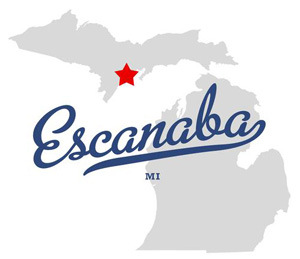You are currently browsing the monthly archive for February 2011.
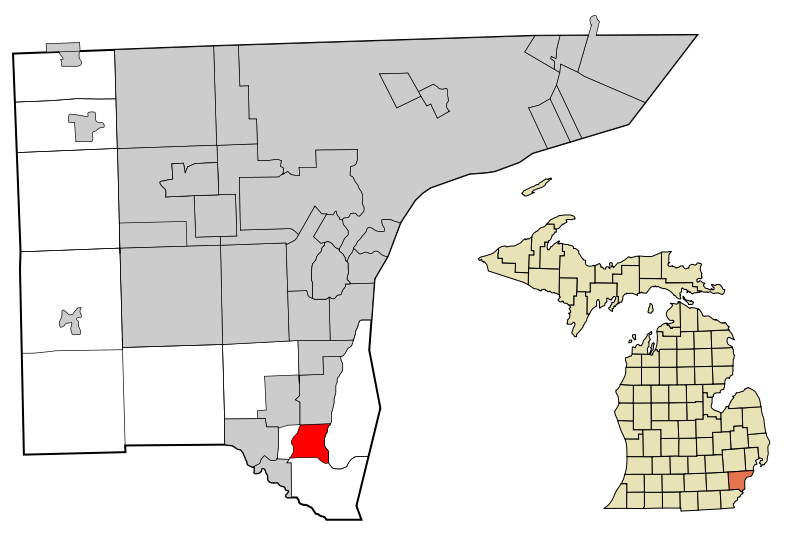 City Administrator, Mark Kibby, just shared the exciting news that Gibraltar adopted a Complete Streets resolution on January 24, 2011. Gibraltar becomes the 28th Michigan policy (that we are aware of) and 4th Wayne County community to adopt a resolution or ordinance. Gibraltar joins Taylor who recently adopted a Complete Streets ordinance, along with Hamtramck and Woodhaven who have passed resolutions in support of Complete Streets. In addition, numerous other communities in southeast Michigan, including the City of Detroit, are actively pursuing policies of their own.
City Administrator, Mark Kibby, just shared the exciting news that Gibraltar adopted a Complete Streets resolution on January 24, 2011. Gibraltar becomes the 28th Michigan policy (that we are aware of) and 4th Wayne County community to adopt a resolution or ordinance. Gibraltar joins Taylor who recently adopted a Complete Streets ordinance, along with Hamtramck and Woodhaven who have passed resolutions in support of Complete Streets. In addition, numerous other communities in southeast Michigan, including the City of Detroit, are actively pursuing policies of their own.
By Holly Madill, Complete Streets Project Coordinator - Michigan Department of Community Health
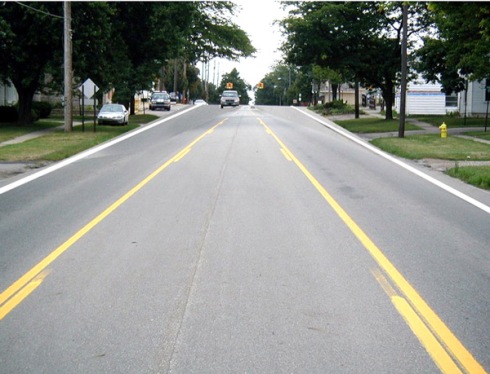
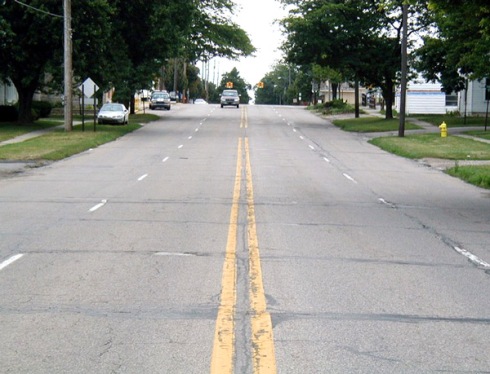 Recent preliminary research from Paul Hamilton, Tri-County Regional Planning Commission, and Dave Morena, Federal Highway Administration (FHWA) Division Office suggests that Michigan could be the national leader in road diets and having road diet supportive policies in place. Analysis of in-state existing and planned 4 to 3 lane conversions (road diets) yields some early and impressive results:
Recent preliminary research from Paul Hamilton, Tri-County Regional Planning Commission, and Dave Morena, Federal Highway Administration (FHWA) Division Office suggests that Michigan could be the national leader in road diets and having road diet supportive policies in place. Analysis of in-state existing and planned 4 to 3 lane conversions (road diets) yields some early and impressive results:
- The Tri-County region (Clinton, Eaton, Ingham) has completed 15 miles of conversion from 4 to 3 lanes. An additional 18.5 miles of conversions are planned by 2035.
- The Genesee County Metropolitan Planning Commission has completed approximately 19.5 miles and released a 2009 Complete Streets technical report that depicts many more by 2035.
- The Michigan Department of Transportation has completed at least 45 miles of road diets on state trunklines around the state.
Hamilton and Morena have surveyed state DOT’s and regional transportation authorities across the country and found few places that compare to these numbers. Add in that Michigan has adopted Complete Streets laws and also has the highest number of local communities that have adopted Complete Streets policies, and one can quickly come to the conclusion that Michigan is becoming a progressive, national leader in active transportation.
Both the Michigan DOT and the FHWA Michigan Division office have stated that 4 to 3 lane conversions are operationally safe for roads with average daily traffic (ADT) or expected ADT of less than 15,000 vehicles per day, and both agencies are willing to explore conversions on roads with higher ADTs as well. To make it easier for communities to convert roadways from 4 to 3 lanes with traffic counts less than 15,000 vehicles per day, no further traffic studies are required to implement a conversion as long as they go through a robust and proactive public involvement process and meet other requirements of law, such as an air quality conformity analysis if they are deemed regionally significant.
According to Morena, in Michigan, the conversion of a road from 4 to 3 lanes does not affect the amount of Act 51 funds the local agency will receive from the state. Distribution of these funds is based on centerline road mileage, which is not affected by the 4-to-3 lane conversion.
We are pleased to report that the City of Woodhaven in Wayne County unanimously passed a resolution supporting Complete Streets on February 15.
RESOLUTION SUPPORTING THE MICHIGAN DEPARTMENT OF TRANSPORTATION (MDOT) COMPLETE STREETS INITIATIVE AS OUTLINED IN PUBLIC ACT 134, AND PUBLIC ACT 135, OF 2010.
WHERAS, increasing walking and bicycling offers improved health benefits for the population and more livable communities; and
WHERAS, a Complete Street is safe, comfortable, and convenient for travel by automobile, foot, bicycle, and transit regardless of age or ability, and
WHERAS, the Michigan Legislature has passed Complete Streets legislation that requires the Michigan Department of Transportation and local governments to consider all users in transportation related projects; and
WHERAS, Complete Streets support economic growth and community stability by providing accessible and efficient connections between home, school, work, recreation, and retail destinations by improving pedestrian and vehicular environments throughout communities; and
WHERAS, Complete Streets enhance safe walking and bicycling options for school-age children, in recognition of the national Safe Routes to School program; and
WHERAS, the City of Woodhaven recognizes the importance of street infrastructure and modifications such as sidewalks, crosswalks, shared use paths, bicycle lanes, signage, and accessible curb ramps, that enable safe, convenient, and comfortable travel for all users; and
NOW THEREFORE BE IT RESOLVED, by the City Council of the city of Woodhaven, Wayne County, Michigan that:
FIRST: to the extent feasible, the City of Woodhaven will incorporate Complete Streets design considerations and practices as a routine part of infrastructure and planning and implementation; and
SECOND: that the City of Woodhaven supports the continued development of the City’s Master Plan, Infrastructure Plan, and Parks and Recreation Plan, that supports the ease of use, safety, and accessibility for all users within the City of Woodhaven.
PASSED AND APPROVED BY THE CITY COUNCIL, CITY OF WOODHAVEN, WAYNE COUNTY, MICHIGAN THIS DAY OF ……………………….
AYES:
NAYS:
ABSTENTIONS:
ABSENT:
ATTEST:
_______________________
Kristie Keene, City Clerk
 In 2010, the State of Michigan passed Complete Streets Legislation that amends both the Michigan Transportation Fund Law (Act 51) and the Michigan Planning Enabling Act (Act 33). To address this,
In 2010, the State of Michigan passed Complete Streets Legislation that amends both the Michigan Transportation Fund Law (Act 51) and the Michigan Planning Enabling Act (Act 33). To address this,
Michigan Citizen Planner is offering workshops on Complete Streets policy and practice across Michigan from March through May, 2011. The series was developed specifically for local elected and appointed officials, planning and zoning practitioners, health officials, walking and biking enthusiasts, local leaders and interested citizens. The training will cover:
- Key components under the Acts that every elected and appointed officials should know;
- An overview of Complete Streets concepts and practice;
- Best practices and Michigan examples;
- The 10 key principles to develop a local ordinance;
- Tools and resources that can be used to implement Complete Streets in a community; and
- Funding opportunities.
The workshops will be held from 6pm – 9:30pm (unless otherwise noted) on the following dates at the following locations:
Tuesday, March 8, 2011 5:30pm – 9pm
Peter White Library, Marquette, MI
Thursday, March 17
BHK Child Development Board Building, Houghton, MI
Thursday, March 24
Lake Superior State University Walker Cisler Center, Sault Ste. Marie, MI
Thursday, March 31
Ann Arbor MSUE Office, Ann Arbor, MI
Wednesday, April 13
Saginaw MSUE Office, Saginaw, MI
Thursday, April 14
Traverse City Michigan Works, Traverse City, MI
Thursday, April 21
Grand Rapids MSUE Office, Grand Rapids, MI
Tuesday, April 26, from 5:30pm – 9pm
West Wayne MSUE Office, Wayne, MI
Wednesday, April 27
Oakland County Planning Building, Pontiac, MI
Thursday, April 28
Mt. Pleasant MSUE Office, Mt. Pleasant, MI
Tuesday, May 3
Berrien County Extension Main Office, Benton Harbor, MI
Wednesday, May 4
Port Huron MSUE Office, Port Huron, MI
Thursday, May 12
MSU Erickson Hall Kiva, East Lansing, MI
Registration for the workshops is available online. Cost to attend each workshop is $55 ($45 for Master Citizen Planners (MCPs)). The fee includes refreshment and resource materials. Continuing Education Units (CEU) may be available for MCPs (0.3 CEUs have been submitted for approval). For questions about registration, please contact Jessica McFarland by email at [email protected] or call 517.432.0704.
If you are unable to attend one of the workshops but are interested in hosting a workshop in your community, contact Michigan Citizen Planner at [email protected] or 517.432.7600. Learn more at 2011 Complete Streets Workshop Series.
Workshop primary partners include Michigan Department of Community Health; and Healthy Kids, Healthy Michigan. Michigan State University partners include the School of Planning Design and Construction; and the MSUE Greening Michigan Institute.
Michigan Citizen Planner is an MSU Extension program within the Land Policy Institute.
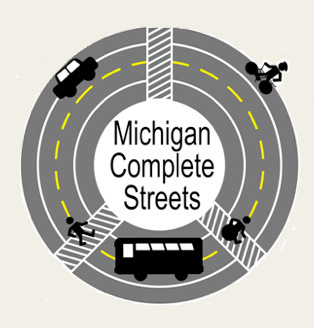 On Friday, January 28, the Michigan Department of Community Health and Michigan Trails and Greenways Alliance launched the Complete Streets Institute. The Complete Streets Institute is a 5-module training series on Complete Streets spanning the basics of how to implementing projects. One hundred trainers, including bike, disabilities, and trail advocates, community officials, county health department staff, MSU Extension specialists, and transportation planners and engineers converged upon Lansing to receive a specialized, day-long training.
On Friday, January 28, the Michigan Department of Community Health and Michigan Trails and Greenways Alliance launched the Complete Streets Institute. The Complete Streets Institute is a 5-module training series on Complete Streets spanning the basics of how to implementing projects. One hundred trainers, including bike, disabilities, and trail advocates, community officials, county health department staff, MSU Extension specialists, and transportation planners and engineers converged upon Lansing to receive a specialized, day-long training.
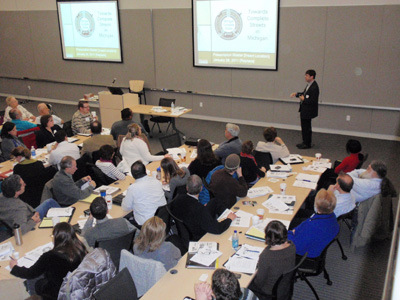 Brad Strader of LSL Planning presented the introductory and influencing policy modules, while Nancy Krupiarz of Michigan Trails and Greenways Alliance presented the stakeholder engagement module. The 100 trainers plan to take the information back to their constituents and jurisdictions. Several agencies and organizations will be launching Complete Streets Institute trainings across the state in the coming months. Stay tuned for dates and a location near you! For information about the Complete Streets Institute or trainers, please contact Holly Madill, MDCH Complete Streets Project Coordinator, at [email protected] or (517) 335-8372.
Brad Strader of LSL Planning presented the introductory and influencing policy modules, while Nancy Krupiarz of Michigan Trails and Greenways Alliance presented the stakeholder engagement module. The 100 trainers plan to take the information back to their constituents and jurisdictions. Several agencies and organizations will be launching Complete Streets Institute trainings across the state in the coming months. Stay tuned for dates and a location near you! For information about the Complete Streets Institute or trainers, please contact Holly Madill, MDCH Complete Streets Project Coordinator, at [email protected] or (517) 335-8372.
To date and our knowledge, 26 Michigan communities have passed Complete Streets policies (resolutions or ordinances), the most in the nation. If the population of all of those communities is added up, over 2,194,607 residents, or 22% of the state’s population, live under local Complete Streets policies that seek to provide its residents with transportation choices, more opportunities for physical activity, and a vibrant community.
| Module Title | Description |
| 1-Overview of Complete Streets | This module defines Complete Streets and explains its importance, history, and benefits, as well as its relationship to other associated topics. |
| 2-Stakeholder Engagement
|
This module introduces the various stakeholders of Complete Streets, explains how to work through a coalition to effect policy and projects, and provides messaging and communication tools and tips. |
| 3-Influencing Policy |
This module provides the tools needed to assess a community’s readiness for Complete Streets policies and the steps a community would take to implement them. In addition, the module defines and explains the policy-making processes and stakeholders, and Complete Streets laws. |
| 4-Complete Streets Planning and Regulations | This module explains policy implementation tools such as planning processes, policies, and regulations. |
| 5-Complete Streets Applications and Design | This module explains the design elements and various treatments/applications used to accomplish Complete Streets policy implementation (sidewalks, bike paths, transit stops, road diets, etc.) through project design. |
The Oxford Village Council unanimously voted to adopt a Complete Streets Resolution at its January 25, 2011 Council Meeting. The Resolution, originally drafted by the Economic Restructuring Committee of the Downtown Development Authority was unanimously supported by the DDA Board and forwarded to the Village Council for consideration of passage. According to Holly Madill, Michigan Department of Community Health’s Complete Streets Project Coordinator, Oxford is the 21st city to pass a Complete Streets Resolution.
Anna Taylor, member of the Economic Restructuring Committee and DDA Board member said, “I encourage any DDA that wants to address how to make their town a more vibrant and welcoming pedestrian community, to take a serious look at Complete Streets. The Village of Oxford is a designated Main Street, so a well thought out Complete Streets policy is essential to our future and can mean the difference between surviving and prospering. To that end, a welcoming pedestrian community is essential.”
Complete Streets are defined as roadways designed and constructed to accommodate safe access for all legal users regardless of age, ability or mode of transportation.
“For years, state roads and highways were designed with a one-size-fits all approach. Lost in that process was the safety needs of those who walk and bicycle, especially senior citizens and children. It was very difficult, if not impossible, for a local community like ours to change that process, to make it about more than just automobiles,” said Don Sherman, Chairman of the Economic Restructuring Committee.
The next step is to work with Dan Burden of The Walkable and Livable Communities Institute, one of the nation’s top walkability experts. “A comprehensive design is needed to look at how the M-24 highway, sidewalks, crosswalks, signage, streetscapes and public spaces can be improved for residents, businesses and visitors of all ages,” says Madonna Van Fossen, Oxford’s DDA Executive Director. Recently, Joe Young, Village Manager and members of the Economic Restructuring Committee made a visit to Lawrence Technological University which resulted in an offer to work with the Village on upcoming public space design projects.
See Oakland Press media coverage.
Download Oxford’s Complete Streets Resolution (PDF version) (Word Version)
On January 17, the Atlas Township Board of Trustees unanimously voted to support a Complete Streets policy after hearing a presentation on Michigan’s new Complete Streets law.
As reported in the the Grand Blanc View:
Brown said Michigan created the policy to encourage local municipalities to accommodate the needs of walkers, bikers and joggers when planning to improve streets in the area. If municipalities take into consideration the suggestions made possible under the Complete Streets policy, Brown said towns could reduce pedestrian risk by 28 percent while also trying to combat health issues, such as obesity, by making it safer for residents to walk rather than drive to places.
“Michigan adopted the policy and joined the growing movement because of a list of important things that help make communities a little safer and healthier,” Brown had previously said.
With support for the policy in place, officials can look toward making improvements in the township, such as adding sidewalks and bike lanes, updating the pedestrian signs and signals in the area, creating crossing islands to slow vehicle traffic and widening of lanes, and having more of a say in the projects.
Brown had also previously told the board adopting the policy would open up communication between Atlas and MDOT or Genesee County.
“There is always a little bit of dialogue with MDOT, but it is limited and more heavily geared toward what MDOT or Genesee County wants,” Brown had said during his presentation last month. “I am sure you all have come up against widening or improvements and have your ideas pushed to the wayside. That will no longer be the case with complete streets in place. They will have to communicate with you.”
Township Supervisor Shirley Kautman-Jones said she thought this type of policy would be beneficial to all the community and said it was important for the board to be aware of it so they could better prepare for future projects.
Editor’s Note: Thank you to m-bike who posted the initial report on Clawson’s Complete Streets policy.
On December 7, 2010, Clawson city council adopted a resolution in support of Complete Streets. City Manager Mark Pollock provided the following background on Complete Streets prior to the unanimous vote.
“Complete Streets” is a design or planning principle to enable safe access for all users, including pedestrians, bicyclists, motorists and transit riders of all ages and abilities. The City of Clawson already incorporates many of the goals of the “Complete Streets” philosophy into the projects it undertakes. This is evidenced by the recent renovations of the downtown main intersection and streetscape projects. The resolution supporting a “Complete Streets” Policy pledges the City’s continued commitment to the complete streets philosophy and may assist the City in applications for funding available under the revised statutes. My recommendation is the resolution supporting a “Complete Streets” Policy for the City of Clawson be approved and forwarded to the Michigan Department of Transportation (MDOT) and State Transportation Commission (STC).
Clawson becomes the fourth Oakland County municipality to adopt a Complete Streets resolution or ordinance, joining Berkley, Ferndale and Novi.
From the Clawson City Council minutes of December 7th, 2010:
CM 12-194-10 CONSIDERATION OF A RESOLUTION SUPPORTING A “COMPLETE STREETS” POLICY FOR THE CITY OF CLAWSON
MOTION BY: Councilmember Airriess
SUPPORTED BY: Councilmember Moore
RESOLVED, the resolution supporting a “Complete Streets” Policy for the City of Clawson be approved and forwarded to the Michigan Department of Transportation (MDOT) and State Transportation Commission (STC).
A RESOLUTION
of the Council of the City of Clawson, Michigan
Supporting a “Complete Streets” Policy for the City of Clawson
WHEREAS, “Complete Streets” are defined as a design framework that enables safe and convenient access for all users, including pedestrians, bicyclists, transit riders, and drivers of all ages and abilities; and
WHEREAS, “Complete Streets” are achieved when transportation agencies routinely plan, design, construct, reconstruct, operate, and maintain the transportation network to improve travel conditions for bicyclists, pedestrians, transit, and freight in a manner consistent with, and supportive of, the surrounding community; and
WHEREAS, development of pedestrian, bicycle, and transit infrastructure offers longterm cost savings and opportunities to create safe and convenient nonmotorized travel; and
WHEREAS, streets that support and invite multiple uses, including safe, active, and ample space for pedestrians, bicycles, and transit are more conducive to the public life and efficient movement of people than streets designed primarily to move automobiles; and
WHEREAS, increasing active transportation (e.g., walking, bicycling and use public transportation) offers the potential for improved public health, economic development, a cleaner environment, reduced transportation costs, enhanced community connections, social equity, and more liveable communities; and
WHEREAS, the City of Clawson’s Master Plan addresses multiple forms of transportation; and
WHEREAS, “Complete Streets” principles have been and continue to be adopted nation-wide at state, county, MPO, and city levels in the interest of proactive planning and adherence to federal regulation that guide transportation planning organizations to promote multi-modal transportation options and accessibility for all users; and
WHEREAS, in response to the Complete Streets Initiative, the State of Michigan adopted an amendment to the Planning Enabling Act in 2010 stating that a community’s master plan shall include all components of a transportation system and their interconnectivity including streets and bridges, public transit, bicycle facilities, pedestrian ways, freight facilities and routes, port facilities, railroad facilities, and airports, to provide for the safe and efficient movement of people and goods in a manner that is appropriate to the context of the community and, as applicable, considers all legal users of the public right-of-way.
NOW, THEREFORE, THE CITY OF CLAWSON RESOLVES:
That the Council of the City of Clawson hereby declares its support of “Complete Streets” policies.
That the Planning Commission is hereby directed to review the master plan in order to determine whether the elements required under Public Act 134 of 2010 Section 33(b)(i) have been satisfied and if not, to prepare an amendment which will bring the master plan into compliance with Public Act 134 of 2010.
Introduced and Passed at a Regular City Council Meeting on Tuesday, December 7, 2010.
AYES: Councilmember Airriess, Mayor Luebs, Councilmember Moore and Palmer
NAYS: None
ABSENT: Councilmember Phillips
ABSTAINED: None
MOTION CARRIED:

